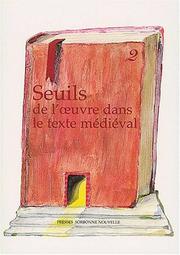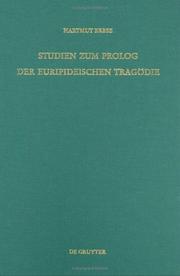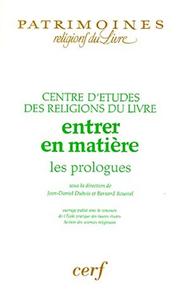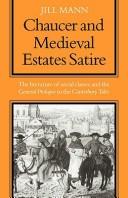| Listing 1 - 8 of 8 |
Sort by
|
Book
ISBN: 9782907301022 2907301020 Year: 2001 Publisher: Villeneuve d'Ascq : Centre d'études médiévales et dialectales de Lille III,
Abstract | Keywords | Export | Availability | Bookmark
 Loading...
Loading...Choose an application
- Reference Manager
- EndNote
- RefWorks (Direct export to RefWorks)

ISBN: 2878542312 9782878542318 9782878542516 2878542517 Year: 2002 Volume: 2-3 Publisher: Paris Presses de la Sorbonne nouvelle
Abstract | Keywords | Export | Availability | Bookmark
 Loading...
Loading...Choose an application
- Reference Manager
- EndNote
- RefWorks (Direct export to RefWorks)
volume 2 : Dans la continuité du volume I, consacré aux Seuils de l'œuvre dans le texte médiéval, ce second (et dernier) recueil s'intéresse plus spécialement aux rapports entre le texte de prologue et le statut générique des œuvres qu'il introduit. La ligne directrice des études ici réunies a été de mettre en évidence la diversité, la plasticité, la capacité d'adaptation dont témoigne, du XIIe au XVe siècle ce " rituel du seuil " que l'on aurait pu croire figé.
Literature --- anno 1200-1499 --- Medieval literature --- French literature --- Prologues and epilogues --- History and criticism. --- Criticism, Textual --- History and criticism --- Medieval literature - History and criticism --- French literature - To 1500 - Criticism, Textual --- Prologues and epilogues - History and criticism --- Criticism, Textual.

ISBN: 3110100002 311084950X 9783110100006 Year: 1984 Volume: 20 Publisher: Berlin
Abstract | Keywords | Export | Availability | Bookmark
 Loading...
Loading...Choose an application
- Reference Manager
- EndNote
- RefWorks (Direct export to RefWorks)
Euripides --- Prologues and epilogues --- Mythology, Greek, in literature --- Tragedy --- History and criticism --- Technique --- -Tragedy --- Drama --- Epilogues --- Postscripts (Epilogues) --- Prefaces --- -Technique --- Mythology, Greek, in literature. --- Tragedy. --- History and criticism. --- Technique. --- -Euripides --- Euripide --- Euripide. Prologues. --- Euripides. Prologen. --- Ėvripid --- Yūrībīdīs --- Euripedes --- Eŭripido --- Eurypides --- Euripidesu --- אוריפידס --- エウリーピデース --- Εὐριπίδης --- Prologues and epilogues - History and criticism --- Euripides - Technique

ISBN: 2204055220 9782204055222 Year: 1998 Publisher: Paris : Editions du Cerf,
Abstract | Keywords | Export | Availability | Bookmark
 Loading...
Loading...Choose an application
- Reference Manager
- EndNote
- RefWorks (Direct export to RefWorks)
Hermeneutics --- Prologues and epilogues --- Herméneutique --- Prologues et épilogues --- Religious aspects --- History and criticism --- Aspect religieux --- Histoire et critique --- Laplanche, François --- Religious literature --- Philosophical literature --- Herméneutique --- Prologues et épilogues --- Laplanche, François --- Religious literature - History and criticism --- Philosophical literature - History and criticism --- Prologues and epilogues - History and criticism

ISBN: 0806125527 9780806125527 Year: 1993 Volume: 2 Publisher: Norman ; London : University of Oklahoma Press,
Abstract | Keywords | Export | Availability | Bookmark
 Loading...
Loading...Choose an application
- Reference Manager
- EndNote
- RefWorks (Direct export to RefWorks)
Pèlerins chrétiens --- Prologue --- Contes médiévaux --- Dans la littérature --- Histoire et critique --- Critique textuelle --- Chaucer, Geoffrey --- Christian pilgrims and pilgrimages in literature. --- Prologues and epilogues --- Tales, Medieval --- History and criticism. --- Criticism, Textual. --- Dans la littérature. --- Histoire et critique. --- Critique textuelle. --- Prologues and epilogues - History and criticism. --- Tales, Medieval - Criticism, Textual.
Book
ISBN: 1782048286 1843844427 9781843844426 Year: 2016 Publisher: Suffolk : Boydell & Brewer,
Abstract | Keywords | Export | Availability | Bookmark
 Loading...
Loading...Choose an application
- Reference Manager
- EndNote
- RefWorks (Direct export to RefWorks)
The prologue to Layamon's Brut recounts its author's extensive travels "wide yond thas leode" (far and wide across the land) to gather the French, Latin and English books he used as source material. The first Middle English writer to discuss his methods of translating French into English, Layamon voices ideas about the creation of a new English tradition by translation that proved very durable.
This book considers the practice of translation from French into English in medieval England, and how the translators themselves viewed their task. At its core is a corpus of French to English translations containing translator's prologues written between c.1189 and c.1450; this remarkable body of Middle English literary theory provides a useful map by which to chart the movement from aliterary culture rooted in Anglo-Norman at the end of the thirteenth century to what, in the fifteenth, is regarded as an established "English" tradition. Considering earlier Romance and Germanic models of translation, wider historical evidence about translation practice, the acquisition of French, the possible role of women translators, and the manuscript tradition of prologues, in addition to offering a broader, pan-European perspective through an examination of Middle Dutch prologues, the book uses translators' prologues as a lens through which to view a period of critical growth and development for English as a literary language.
Elizabeth Dearnley gained her PhD from the University of Cambridge.
Language arts. --- Communication arts --- Language arts --- Communication --- Study and teaching --- Literature, Medieval --- French literature --- French language --- Prologues and epilogues --- Translators --- Translations into English --- History and criticism. --- History --- Interpreters --- Linguists --- Translating services --- Old French language --- Franco-Venetian language --- European literature --- Medieval literature --- Old French --- Literature, Medieval - Translations into English - History and criticism --- French literature - Translations into English - History and criticism --- French language - To 1300 --- Prologues and epilogues - History and criticism --- Translators - History - To 1500
Book
ISSN: 00817236 ISBN: 348436047X 3110920743 9783484360471 Year: 1999 Volume: 47 Publisher: Tübingen Niemeyer
Abstract | Keywords | Export | Availability | Bookmark
 Loading...
Loading...Choose an application
- Reference Manager
- EndNote
- RefWorks (Direct export to RefWorks)
Eingerahmt von einer Einleitung, welche Zielsetzung und Methodik der Arbeit benennt, und einem Schlußkapitel, das Träger, Formen und Publikum der enzyklopädischen Wissensvermittlung in Europa von 1100 bis etwa 1500 einzugrenzen versucht, beleuchtet die Studie insgesamt acht paradigmatische Fälle der Weitergabe praktischen imago mundi-Wissens: Unter den nach kommunikationswissenschaftlicher Methodik analysierten Prologen finden sich 'Bestseller' des Mittelalters wie das "Elucidarium" des Honorius Augustodunensis, der deutsche "Lucidarius" oder Brunetto Latinis "Livres dou Tresor" ebenso wie unikal überlieferte (Herrads von Hohenburg "Hortus deliciarum") und wenig verbreitete Enzyklopädien (Hiltgart von Hürnheim). Die detaillierte, bis in den Wortlaut der Prologe gehende Untersuchung bezieht auch den kulturgeschichtlichen Kontext der lateinischen, deutschen, französischen, spanischen und in Italien entstandenen Werke mit ein. Als Ergebnisse zeigen sich folgende, hier nur grob umschriebene Konstanten der Wissensvermittlung: das Schwanken der Autoren zwischen der Anonymisierung ihrer Person und übertriebener Selbstdarstellung, das Auftauchen einer neuen weiblichen Berufsschriftstellerin; die zunehmende Konkurrenz der jungen Volkssprachen zum bislang dominierenden Latein, die Wissensorganisation nach drei konkurrierenden Modellen, die curiositas des Laien als primäres Schreibmotiv, schließlich der kaum eingrenzbare Rezipientenkreis der Werke. Ein Bild- und Textanhang (mit Vergleichstexten) rundet die Arbeit ab.
Prologues and epilogues --- History of civilization --- History of Europe --- anno 1100-1199 --- anno 1200-1499 --- Encyclopedias and dictionaries --- Transmission of texts --- Learning and scholarship --- History and criticism. --- History. --- History --- History and criticism --- Encyclopédies et dictionnaires --- Early works to 1600 --- Ouvrages avant 1600 --- Histoire et critique --- Medieval learning and scholarship --- Education, Medieval --- Literary transmission --- Manuscript transmission --- Textual transmission --- Criticism, Textual --- Editions --- Manuscripts --- Books of knowledge --- Cyclopedias --- Dictionaries --- Encyclopedias and dictionaries, English --- Knowledge, Books of --- Subject dictionaries --- Reference books --- Encyclopedias and dictionaries - Early works to 1600 - History and criticism. --- Prologues and epilogues - History and criticism. --- Transmission of texts - History. --- Learning and scholarship - History - Medieval, 500-1500.

ISBN: 052120058X 0521097959 0511552971 0511864477 9780521200585 9780511552977 9780521097956 Year: 1973 Publisher: Cambridge
Abstract | Keywords | Export | Availability | Bookmark
 Loading...
Loading...Choose an application
- Reference Manager
- EndNote
- RefWorks (Direct export to RefWorks)
This book is an attempt to discover the origins and significance of the General Prologue-to the Canterbury Tales. The interest of such an inquiry is many-sided. On the one hand, it throws light on the question of whether `life' or 'literature' was Chaucer's model in this work, on the relationship between Chaucer's twenty-odd pilgrims and the structure of medieval society, and on the role of their `estate' in determining the elements of which Chaucer composes their portraits. On the other hand, it makes suggestions about the ways in which Chaucer convinces us of the individuality of his pilgrims, about the nature of his irony, and the kind of moral standards implicit in the Prologue. This book suggests that Chaucer is ironically substituting for the traditional moral view of social structure a vision of a world where morality becomes as specialised to the individual as his work-life.
Chaucer, Geoffrey --- Estates (Social orders) --- Prologues and epilogues --- Christian pilgrims and pilgrimages in literature --- Satire, Medieval --- Tales, Medieval --- Social history --- Social problems in literature --- Social classes in literature --- Satire --- History --- History and criticism --- Religious aspects --- Chaucer, Geoffrey, --- Political and social views --- -Social classes in literature --- -Social problems in literature --- -Satire --- -Prologues and epilogues --- -Estates (Social orders) --- -Descriptive sociology --- Social conditions --- Sociology --- Medieval satire --- Commons (Social order) --- Feudalism --- Epilogues --- Postscripts (Epilogues) --- Prefaces --- Comic literature --- Literature --- Wit and humor --- Invective --- Medieval tales --- -Chaucer, Geoffrey --- -Political and social views --- -History and criticism --- Christian pilgrims and pilgrimages in literature. --- Social problems in literature. --- Social classes in literature. --- History and criticism. --- Religious aspects. --- Political and social views. --- -Commons (Social order) --- Descriptive sociology --- Chaucer, Jeffrey, --- Chʻiao-sou, Chieh-fu-lei, --- Chieh-fu-lei Chʻiao-sou, --- Choser, Dzheffri, --- Choser, Zheoffreĭ, --- Cosvr, Jvoffrvi, --- Tishūsar, Zhiyūfrī, --- Arts and Humanities --- Estates (Social orders) - England - History - To 1500 --- Prologues and epilogues - History and criticism --- Satire, Medieval - History and criticism --- Tales, Medieval - History and criticism --- Social history - Medieval, 500-1500 --- Satire - Religious aspects --- Chaucer, Geoffrey, - -1400 - Canterbury tales - Prologue --- Chaucer, Geoffrey, - -1400 - Political and social views --- CHAUCER (GEOFFREY), d. 1400 --- LITERATURE AND SOCIETY --- CANTERBURY TALES --- PROLOGUE --- ENGLAND --- Chaucer, Geoffrey, - -1400
| Listing 1 - 8 of 8 |
Sort by
|

 Search
Search Feedback
Feedback About UniCat
About UniCat  Help
Help News
News